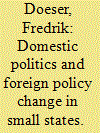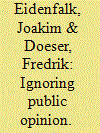|
|
|
Sort Order |
|
|
|
Items / Page
|
|
|
|
|
|
|
| Srl | Item |
| 1 |
ID:
105959


|
|
|
|
|
| Publication |
2011.
|
| Summary/Abstract |
The article sets out to further an understanding of how domestic politics can impact on foreign policy change in small states. The case of interest is the change that occurred in the foreign policy of Denmark when its government managed to put an end to the 'footnote policy' in mid-1988. The main conclusion is that changes in two particular domestic political factors, in terms of political party opposition and public opposition, facilitated a change in foreign policy for the Danish government. Changes in party and public opposition created opportunities for the government to use foreign policy change as a strategy to increase its political power on the domestic scene. In this case of foreign policy change, domestic political factors and external forces were equally important.
|
|
|
|
|
|
|
|
|
|
|
|
|
|
|
|
| 2 |
ID:
150103


|
|
|
|
|
| Summary/Abstract |
This article investigates the Swedish decision to participate in Operation Unified Protector in Libya and the Finnish decision to refrain from the same operation. It takes as its theoretical point of departure the concept of strategic culture and argues that differences in the strategic culture of the two countries contributed to the differences in behavior toward the Libya intervention. The Finnish and Swedish strategic cultures differ with respect to the core tasks of the armed forces, willingness to use force, and with respect to what types of operations and organizational frameworks Finland and Sweden find it appropriate to participate in.
|
|
|
|
|
|
|
|
|
|
|
|
|
|
|
|
| 3 |
ID:
161525


|
|
|
|
|
| Summary/Abstract |
This article contributes to an explanation of why Poland, after a period of almost two years’ hesitation, decided to dispatch military forces to the United States-led coalition against the Islamic State in June 2016. The Polish case is examined by applying the concept of strategic culture, taking into account a state’s core military strategic beliefs and the historical experiences on which these beliefs are based. The case study shows that strategic culture shaped the Polish decision-making on the coalition, by predisposing the decision-makers toward a typical Polish behavior in international military operations, namely to exchange security benefits with important allies. The article also has implications for the general study of strategic culture, by specifying the relationship between historical experiences and strategic culture.
|
|
|
|
|
|
|
|
|
|
|
|
|
|
|
|
| 4 |
ID:
147965


|
|
|
|
|
| Summary/Abstract |
This article investigates why the governments of Australia and Poland decided to contribute military forces to the United States led invasion of Iraq in March 2003 when a majority of Australian and Polish citizens were opposed to national involvement in the invasion. The objective of the article is to increase understanding of the conditions under which governments ignore the public in their foreign policymaking. The article examines the explanatory power of four intervening variables: issue salience, elite debate, timing of the next election and the importance assigned to international gains by the government. On the basis of the Direct Method of Agreement, the article concludes that government perceptions of international gains and the timing of the next election were potentially necessary factors for the outcomes of the cases, while issue salience and elite debate were not necessary conditions. A distant election may, thus, provide sufficient electoral protection for a government that conducts a foreign policy to which the public is opposed.
|
|
|
|
|
|
|
|
|
|
|
|
|
|
|
|
| 5 |
ID:
181660


|
|
|
|
|
| Summary/Abstract |
This article introduces supervised machine learning to the study of German strategic culture, analyzing both how German strategic culture has changed and the impact of strategic culture on Germany's military engagement between 1990 and 2017. In contrast with previous qualitative research on strategic culture, supervised machine learning can yield measurable and empirical insights into strategic culture and its effects at any given point in time over a very long period, based on the reproduction of human coding of a very extensive set of security policy documents. The article shows that German strategic culture has changed slowly and in a nonlinear way after the Cold War, and that strategic culture, when controlling for confounding variables and the temporal order, has a measurable impact on Germany's military engagement. The article demonstrates the analytical value of machine learning for future studies of strategic culture.
|
|
|
|
|
|
|
|
|
|
|
|
|
|
|
|
| 6 |
ID:
188252


|
|
|
|
|
| Summary/Abstract |
This article aims at clearing up a widespread misunderstanding in previous research that the classical strategic perspective, based on the writings of Carl von Clausewitz and his contemporary followers, shares ontological assumptions with realism. Although both perspectives perceive a constant state of disharmony in international politics, they differ substantially in their assumptions about state-centrism, actor behaviour, and the role of unpredictability. As the relationship between the perspectives is ambiguous, the article argues that scholars should treat them as two separate theoretical entities. The greater scholarly relevance of the article lies in its contribution to conceptual clarity.
|
|
|
|
|
|
|
|
|
|
|
|
|
|
|
|
| 7 |
ID:
153434


|
|
|
|
|
| Summary/Abstract |
This article integrates literature on strategic culture with literature on the domestic politics of foreign policy, illustrating how the interaction of culture and domestic political calculation can influence government foreign policy on participation in international military operations. Empirically, the article investigates the decision made by the Government of Finland to refrain from participation in the military intervention in Libya in March–April 2011. The Finnish decision-making illustrates that domestic politics, in particular the factor of election timing, can strengthen the feeling among decision-makers that they should follow the country’s strategic culture. The article ends with theorization on the domestic political conditions under which decision-makers are more or less likely to deviate from strategic culture.
|
|
|
|
|
|
|
|
|
|
|
|
|
|
|
|
| 8 |
ID:
135765


|
|
|
|
|
| Summary/Abstract |
This article examines the necessary conditions behind the decision made by the Government of Sweden to participate with fighter jets in the monitoring of the no-fly zone over Libya in March 2011. The article identifies five explanatory factors whose presence was necessary for Sweden's military contribution: a feeling of moral obligation to intervene on the part of the government; the international legal foundation for the operation; strong leadership provided by NATO; broad parliamentary support; and the availability of military capabilities.
|
|
|
|
|
|
|
|
|
|
|
|
|
|
|
|
| 9 |
ID:
166601


|
|
|
|
|
| Summary/Abstract |
This article investigates how strategic culture influenced the decision-making of Australia and Poland regarding the global coalition against the Islamic State. In the coalition, Australia has followed its tradition of active participation in United States-led operations, while Poland has embarked on a more cautious line, thereby breaking with its previous policy of active participation. The article examines how Australian and Polish responses to the coalition were shaped by five cultural elements: dominant threat perception, core task of the armed forces, strategic partners, experiences of participating in coalitions of the willing, and approach to the international legality of expeditionary operations. It finds that Australia and Poland differed on all five elements but that the major differences are found in dominant threat perception and core task of the armed forces.
|
|
|
|
|
|
|
|
|
|
|
|
|
|
|
|
| 10 |
ID:
123570


|
|
|
|
|
| Publication |
2013.
|
| Summary/Abstract |
This article asks why the Government of Poland participated in the invasion of Iraq in March 2003 when a large majority of the Polish public was opposed to national involvement in Iraq. The aim is to further an understanding of the circumstances under which democratic governments ignore public opinion in their foreign policy decision-making. The article argues that a combination of three circumstances increased the willingness of the government to ignore the public. First, the Iraq issue had relatively low salience among the Polish voters, which decreased the domestic political risks of pursuing the policy. Second, the government's Iraq policy was supported by a considerable consensus among the political elite. Third, the political elites were unified in their perceptions that participating in the invasion would yield essential international gains for Poland.
|
|
|
|
|
|
|
|
|
|
|
|
|
|
|
|
|
|
|
|
|